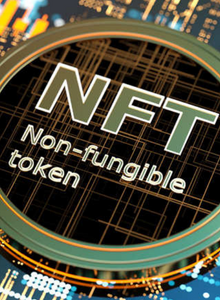NFTs or Non-Fungible Tokens, are a type of digital asset created using blockchain technology, the same technology that underpins cryptocurrencies like Bitcoin and Ethereum.
NFTs represent ownership or proof of authenticity of a unique item or piece of content, usually a digital one such as art, music, videos, virtual real estate, collectibles and more.
Unlike cryptocurrencies such as Bitcoin or Ethereum, which are fungible and can be divided into smaller units, NFTs are unique and cannot be divided into smaller parts. Each token has a distinct information set, making each one unique and different from the other.
NFTs are built on blockchain networks, which verify their ownership and authenticity. The blockchain ledger tracks the ownership history of each NFT, providing a transparent and immutable proof of authenticity and ownership.

NFTs can be programmed with smart contracts and can be integrated into various applications, platforms and ecosystems. This means they can be used in different virtual environments, video games and platforms, depending on their design.
Holding an NFT means that you have legal ownership of a unique digital item. This ownership can be transferred to others through buying, selling or trading on various NFT marketplaces.
NFTs can be bought and sold on various online marketplaces and their values are determined by various factors including their rarity, demand and the perceived value of the digital asset they represent.
Information about the NFT (like who created it, its transaction history, etc.) is permanently stored on the blockchain. This means that it cannot be altered or deleted.
NFT’s have emerged as an un-correlated asset class in their own right. At the peak of the recent crypto boom sought after NFT’s such as Bored Apes were selling for extraordinary prices. More recently prices have collapsed significantly.

Many NFTs also have built-in royalties, which means that the original creator can receive a percentage of sales whenever the NFT is resold in the marketplace.
It’s important to note that owning an NFT does not necessarily grant the owner copyright over the digital asset it represents. The specifics of what exactly are the NFT owner’s rights can vary greatly.
There has been criticism regarding the environmental impact of NFTs, as the blockchain networks they often operate on (like Ethereum) have been known to consume large amounts of energy. However, there are ongoing efforts to mitigate these environmental impacts, including network upgrades and the development of more energy-efficient blockchains. Also, the use of renewable energy is gaining a greater foothold.
NFTs have opened up new possibilities in the world of digital art and collectibles, creating a way to prove ownership and authenticity of digital assets in a decentralized manner. However, they are also a relatively new and evolving space, and as such, they come with their own challenges and criticisms.

PrimaryMarkets provides investors with access to companies that are shaping the future of blockchain and the Web3 revolution. We provide access to opportunities previously only accessible to institutional investors.
One example is Animoca Brands a global leader in gamification and blockchain with a large portfolio of over 450 investments in Web3 projects, and with the mission to advance digital property rights and contribute to building the open metaverse. Animoca Brands has always been a supporter of NFT creator royalties. Royalties for NFT creators are essential to a decentralized and democratic ecosystem, ensuring fair distribution of value to contributors or creators, which in turn supports value creation across all NFT commons. Animoca believes that royalties are a critical part of the Web3 ethos.
As a result, Animoca Brands is introducing a set of 3 NFT licenses that require the payment of creator royalties as a condition for receiving licenses to that NFT art and utility. These NFT licenses are accessible to all under a Creative Commons license.
